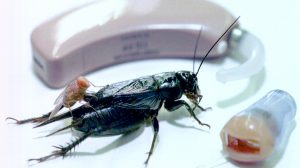
A fly sits atop a cricket listening to sounds inaudible to the human ear. A new nanochip inside a hearing aid is capable of mimicking the fly’s acoustic sensors. Submitted photo
OXFORD, Miss. – The acoustical organs of insects and their potential to revolutionize human hearing aids is the topic for a monthly public science forum organized by the University of Mississippi Department of Physics and Astronomy.
The fall semester’s first meeting of the Oxford Science Cafe is set for 6 p.m. Sept. 19 at Lusa Bakery Bistro and Bar, 1120 North Lamar Blvd. on Oxford. Ronald N. Miles, chair and distinguished professor of mechanical engineering at the State University of New York at Binghamton, will discuss “Biomimetic Acoustic Sensors for Hearing Aids.” Admission is free.
“We have studied the hearing in mosquitoes, flies, crickets, midges, caterpillars and spiders to explore remarkable ways these insects sense sound,” Miles said. “In this presentation, I will describe our discovery of the amazing directional ears of a special fly, Ormia ochracea, which is able to localize sound better than humans can, even though its ears fit in a space only 1 millimeter across.”
Mile’s 40-minute presentation also will include discussion about the development of biomimetic microphones based on this discovery, which show better performance than existing hearing aid microphones.
“We have also recently discovered new ways to sense sound based on the use of nanoscale fibers, such as insect hairs or spider silk,” he said. “This has resulted in a directional microphone that has ideal flat frequency response from 1 hertz to 50 kilohertz, far beyond the range of human hearing.
“There remains much more to learn from nature to create technology to improve hearing.”
Miles also will present a talk in the colloquium series of the Department of Physics and Astronomy at 4 p.m. that day in Lewis Hall, Room 101, on “The Naonphone: Sensing sound with nanoscale spider silk.”
Miles’ appearance should be interesting for everybody, said Marco Cavaglia, organizer of the Science Cafe series.
“Dr. Miles is an expert in acoustic engineering, electronic engineering and optical engineering,” said Cavaglia, associate professor of physics and astronomy. “His presentations are sure to be fascinating and enlightening.”
Miles received a bachelor’s degree in electrical engineering from the University of California at Berkley, and earned master’s and doctoral degrees in mechanical engineering from the University of Washington at Seattle. He holds memberships in the Acoustical Society of America, American Society of Engineering Education, Institute of Electrical and Electronic Engineers, American Society of Mechanical Engineers and the International Society for Neuroethology.
For more information about Oxford Science Cafe programs, go to http://www.phy.olemiss.edu/oxfordsciencecafe. For more information about the Department of Physics and Astronomy, visit http://www.olemiss.edu/depts/physics_and_astronomy or call 662-915-7046.